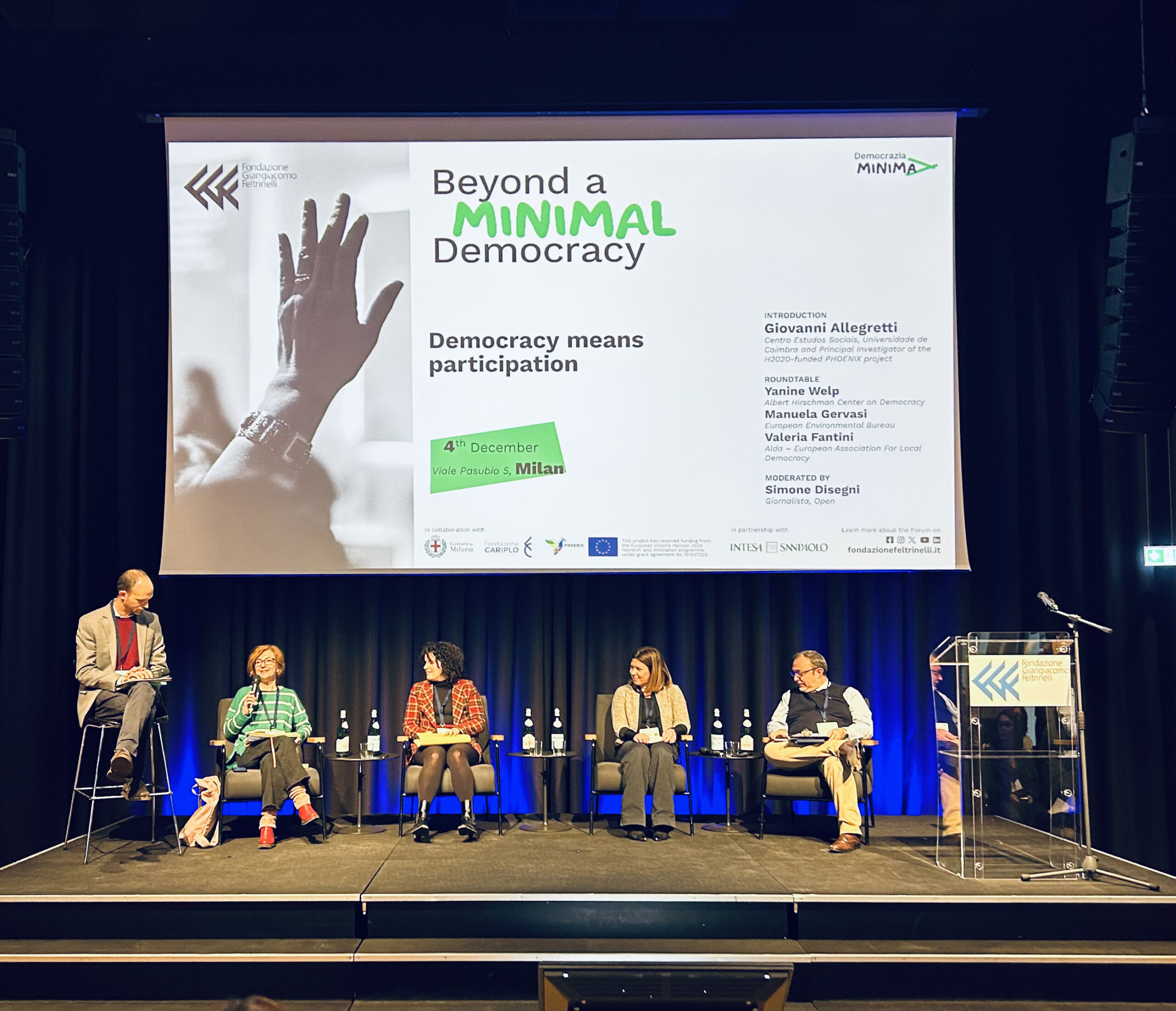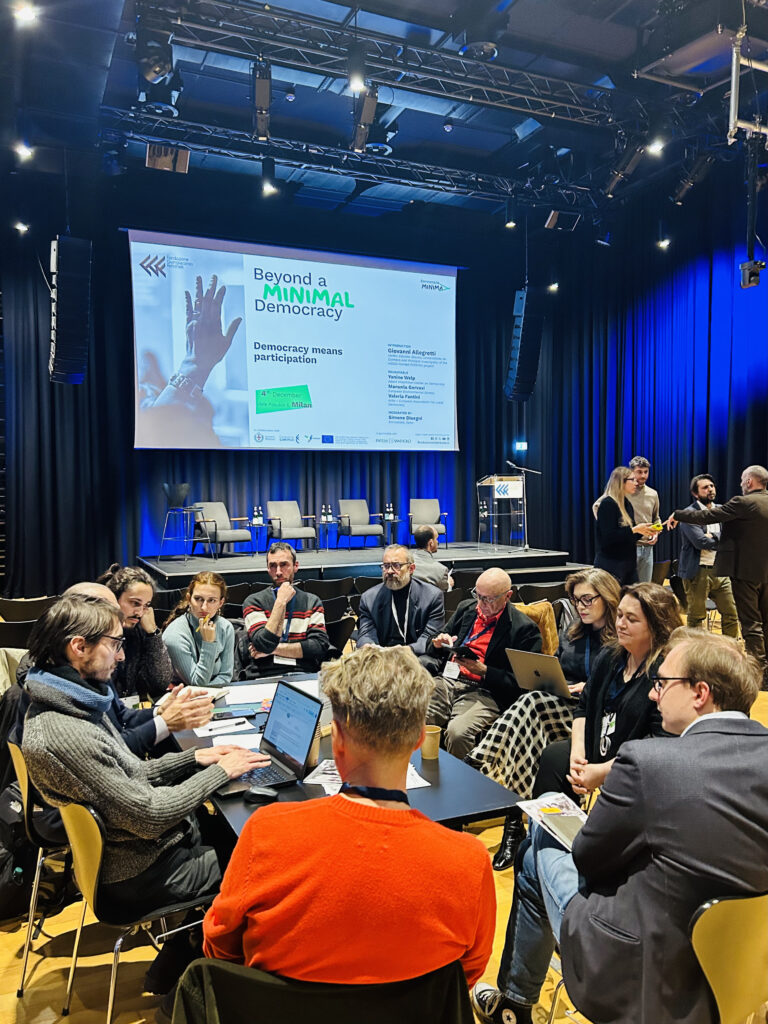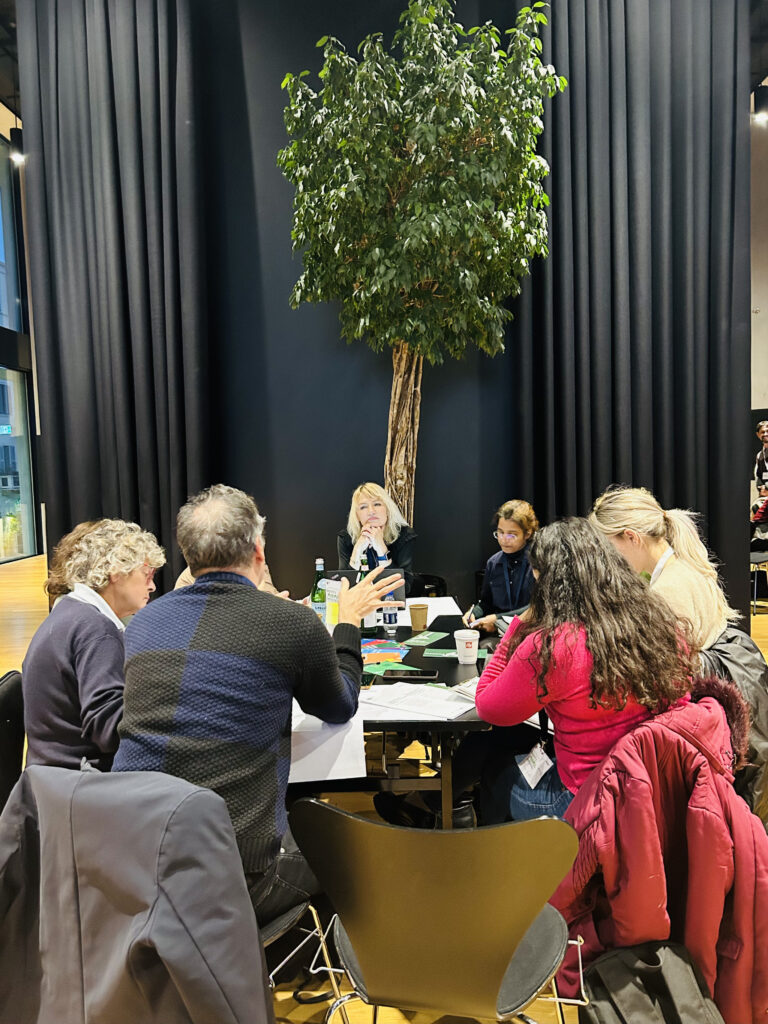
Unpacking the Beyond a Minimal Democracy Event
Hosted by the Giangiacomo Feltrinelli Foundation from December 4 to 5 2023, the event Beyond a Minimal Democracy served as a platform to showcase and analyse the most intriguing European experiences of Democratic Innovation. The two-day International Forum marks a significant milestone in the pursuit of revitalising representative democracy.
With the backdrop of representative democracy facing challenges and limitations in recent decades, including populist leadership, technocratic pressures, and hegemonic narratives from right-wing forces, the forum sought to explore under what conditions participatory and deliberative processes could act as a transformative force for democratic systems and civil society.
Plenary sessions
Democracy means participation
What kind of democracy for the future?
Deliberative democracy on climate change
Working groups
The initiative has been a resounding success, bringing together over 60 participants and fostering a rich exchange of ideas across six working groups chaired by esteemed researchers and practitioners from the PHOENIX consortium.
Discover more about the topics discussed by the working tables and the pathways suggested to enhance participatory and deliberative processes within democratic frameworks.
TABLE 1

Participatory Democracy and Institutional Politics: Cooperation or Antagonism?
Chair: Jón Ólafsson (University of Iceland)
Concept: The opportunities for participation are multiplying: in a disintermediated society, individuals seek new, independent forms for mobilization, choosing which cause to engage with on each occasion. How can these spontaneous forms of collective action dialogue with traditional organizational structures of institutional politics? How can political parties connect with new spaces and movements which contribute to the rise of political thought? How can the exchange of practices and ideas be facilitated among these actors?
Key results: Recommendations included a redistribution and redefinition power, the implementation of participatory tools at the local level, and systematic implementation of participatory tools for shaping the political agenda based on public opinion and the identification of ways for democracies to absorb and benefit from counter-powers like protest movements and civic organisations.
TABLE 2
Participatory Green Transition: Tools and Methods
Chair: Sheila Holz (CES, University of Coimbra)
Concept: Citizen engagement is a crucial factor for any policymaking that aims to be inclusive and sustainable. The green transition is one of the most urgent and global challenges of our time, involving citizens at multiple levels. For its legitimacy as well as its effectiveness, it requires that stakeholders participate in its implementation. Which tools and methods of Democratic Innovation are most suitable for ensuring the support for a rapid and tangible transition? Citizens’ Climate Assemblies are already practised at the European level, but are they the most suitable tool for discussing transnational, complex, and intersectional issues such as the climate crisis? From the local administrative level to the national level, we will discuss tools and methods for a genuinely participatory and legitimate green transition.
Key results: Recommendations focus on inclusivity, emphasizing transparent processes, continuous feedback, and a comprehensive stakeholder map. The group highlighted the importance of transforming macro-scale issues into localized solutions, recognizing the crucial relationship between local and global concerns.

TABLE 3

Inclusive Deliberative Pathways: How to Represent the Absent
Chair: Alfredo Ramos (Institute of Public Policies and Goods -CSIC)
Concept: What does it mean to be inclusive when it comes to defining deliberative processes? The selection of mini-publics or participants in citizens’ assemblies must be highly representative to generate trust in deliberation. What are the best and fairest criteria for selecting participants? How can artists and facilitators bring the concerns of the absentees to the discussion table? How can we overcome the biases of “presentism” and change the deliberative framework towards greater representativeness?
Key results: The recommendations discussed include designing outcomes with consideration for relevant communities, targeting underrepresented groups through intersectional methods, facilitating access by rewarding civic engagement, ensuring means of expression that value personal experiences, creating comfortable and safe spaces, and being transparent and inclusive in media coverage.
TABLE 4
Digital Citizenship: New Generations and Participation Platforms
Chair: Kristina Reinsalu (e-Governance Academy)
Concept: New generations have learned to use digital platforms to connect beyond territorial limits and national borders, achieving unexpected levels of aggregation. New technologies can facilitate participation by providing not only coordination and communication tools but also ensuring the transparency of participatory processes. In what specific ways can platforms serve these purposes? What are the risks associated with e-democracy? What role do platforms play in connecting mini-publics and other political actors? What are the biases of institutional actors towards online activism, and what is the conversion rate into real-world mobilisation?
Key results:
Main findings include recommendations for encouraging inclusiveness, emphasising digital education and civic skills, promoting personalised citizen approaches, allocating necessary resources systematically, and constitutionalising and institutionalising the digital engagement process for amplified citizen voices and increased participation.

TABLE 5

Participatory Practices at Scale: Thinking Globally, Acting Locally
Chair: Iacopo Zetti (University of Florence)
Concept: Transnational challenges, supranational decision-making bodies and national parliaments appear distant from citizens’ lives, yet their decisions have an immediate impact on the present and future. Who is responsible for bringing the concerns of territories and communities to these tables? Can deliberative and participatory assemblies be extended to citizens from different countries, starting from common challenges? How is mediation done between the outcomes of local participation and the interests of the globalized society? If the ongoing challenges are global and transnational, what makes legitimate the policies that result from the deliberation of local minipublics?
Key results: Recommendations for effective local participatory processes include ensuring locally visible issues, fostering community belonging, establishing structured collaborative practices, involving independent organisations, empowering citizens in setting agendas, and utilising processes to enhance dialogue and trust among stakeholders.
TABLE 6
Informing for Deliberation: The Role of Media in Healthy Deliberative Practice
Chair: Kelsey Beltz (The Good Lobby)
Concept: Disinformation, polarization, and pollution of public discourse are challenges that all democracies must face. A properly informed public, equipped with the necessary resources to understand the issues on which it is called to express itself, is an irrevocable condition for the quality of participatory moments. What is the role of journalists and communicators in relation to deliberative democracy? How can correct information be provided on complex issues? What is the current media coverage of participatory practices outside of election periods? What can the media do to ensure that politics is no longer just a matter for a few?
Key results: Key recommendations include emphasising increased regulation of AI in the media, enhancing media accountability, expanding access, creating a pluralistic information system, and emphasising the need for media to simplify and clarify complex news for broader public understanding.



Follow us on: